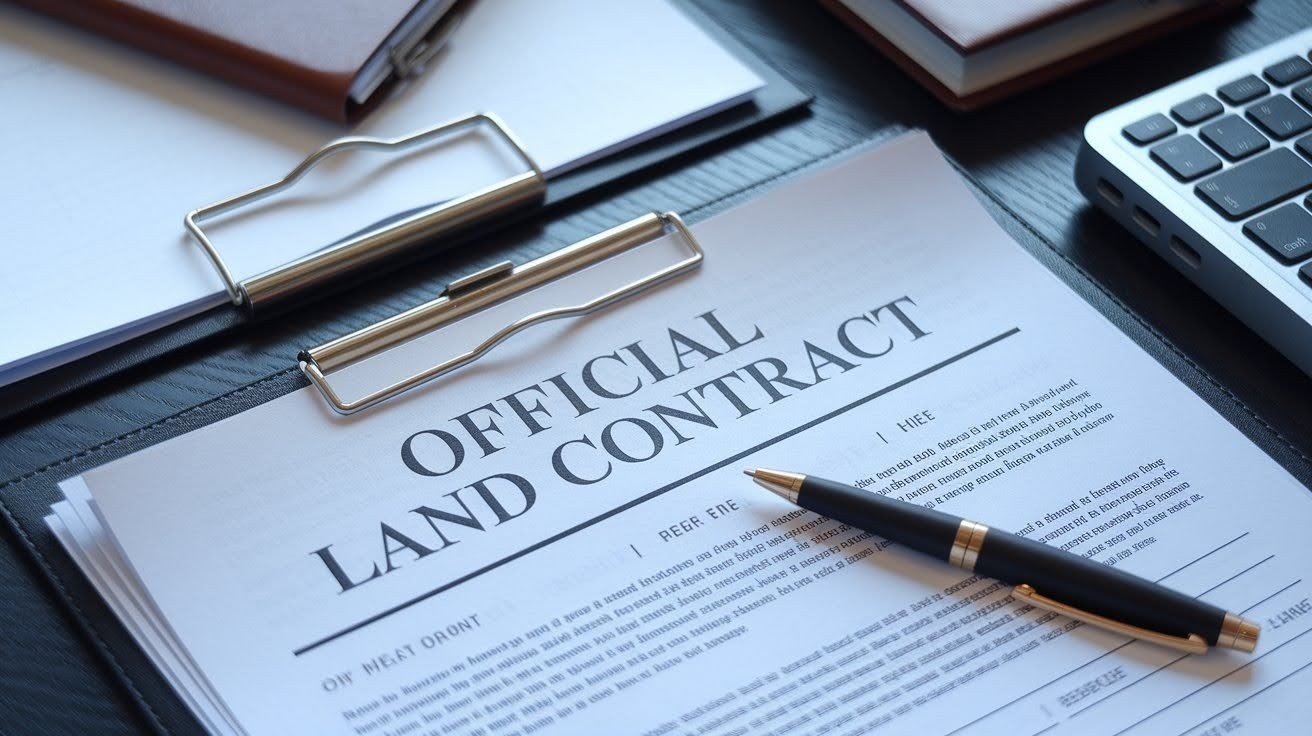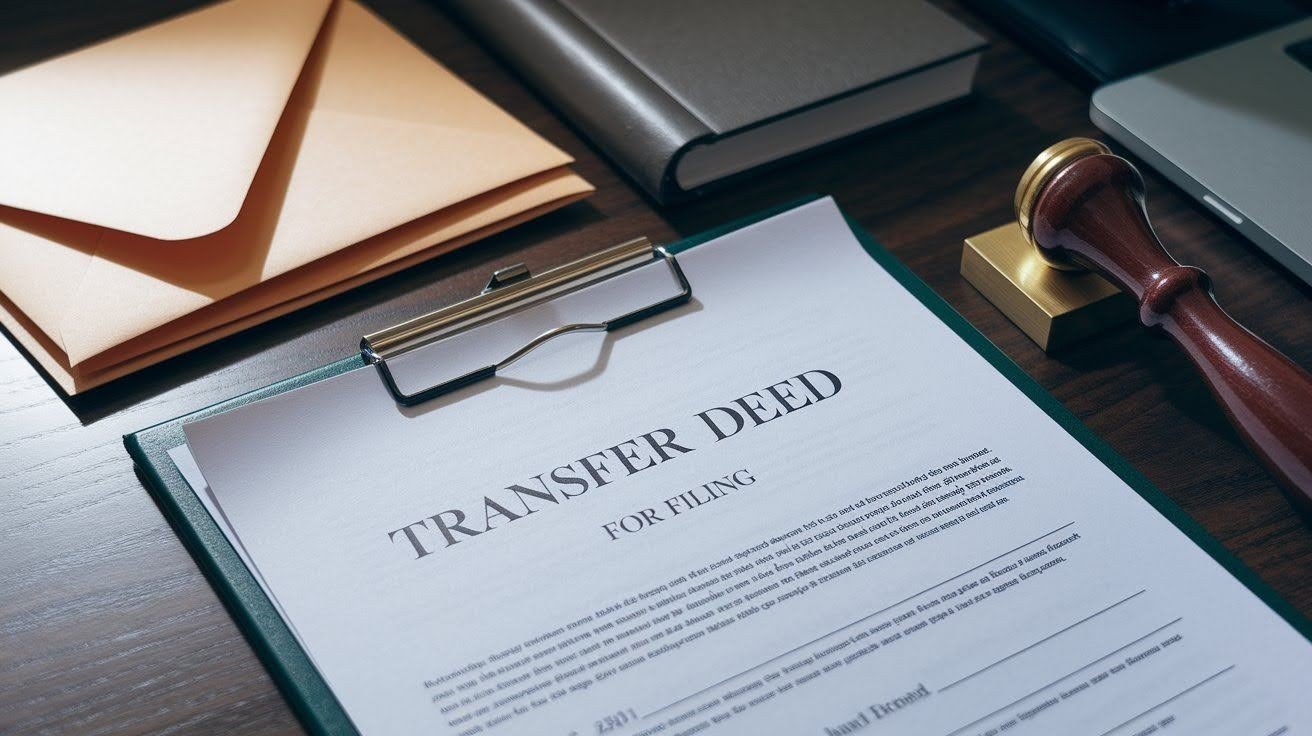Choosing to sell your land by yourself, without a realtor, can save you thousands of dollars in commission fees, but there’s a fair amount of paperwork, and many landowners are afraid that they’ll make a mistake, such as forgetting to fill out a form.
If you are selling a piece of land by owner, or FSBO, you will be responsible for gathering all of the documents and items required to sell your land. This sounds complicated at first, but it is really quite simple once you know what you need and why.
When you strip away all the extra steps you might need to take, generally, you need 8 to 14 main documents to sell your home, depending on the type of property you own and where you live.
Paperwork for Selling Land by Owner
The paperwork for selling land by owner might seem overwhelming at first. But once you understand each document’s purpose, the process becomes much simpler. Think of these papers as your protection and proof throughout the sale.
Each document serves a specific role in your transaction. Some prove you own the land, others outline the sale terms, and a few protect both you and your buyer. Getting these right means avoiding legal problems down the road.
Your state and county may have specific requirements, too. What works in Texas might differ from California or Florida. Always check your local rules before assuming you have everything covered.
Quick Land Seller’s Paperwork Checklist
Before you list your land for sale, create a folder with all these documents. Having everything ready shows buyers you’re serious and organized. This preparation can help you close the deal faster and with fewer problems.
Essential Core Documents
Before you start the selling process, make sure you have all the key paperwork in place. These essential core documents ensure a smooth and legally sound land sale.
Title Deed: Proof of Ownership

Your title deed is the most important document you’ll need. This legal paper proves you own the land and have the right to sell it. Without a valid title deed, you cannot legally transfer ownership to anyone else.
Most landowners receive their deed when they buy property or inherit it. If you can’t find yours, contact your county recorder’s office for a certified copy. They keep records of all property deeds in their database.
The deed contains vital information like legal descriptions, property boundaries, and your name as owner. Buyers and title companies will carefully review this document before moving forward. Make sure all the information matches the current records exactly.
Purchase Agreement (Land Sale Contract)

This contract is where you and your buyer agree on everything. It spells out the sale price, payment method, closing date, and any special conditions. Both parties sign this document to make the deal official and binding.
You can download templates online or have a real estate attorney draft one. The contract should clearly state what happens if either party backs out. Include details about deposits, inspections, and who pays closing costs.
Never rush through this document just to make a sale. Take time to read every line and understand what you’re agreeing to. Once signed, this contract becomes legally enforceable, so accuracy matters greatly.
Disclosure Document

Honesty is your best policy when filling out disclosure forms. You must tell buyers about any known problems with the land. This includes drainage issues, soil contamination, boundary disputes, or anything else that affects the property’s value.
Each state has different disclosure requirements for land sales. Some require detailed forms, while others just need a simple written statement. Research your state’s specific rules to stay compliant with local laws.
Hiding problems can lead to lawsuits after the sale closes. If buyers find undisclosed issues later, they can sue you for damages. Being upfront protects you legally and builds trust with serious buyers.
Bill of Sale

Think of the bill of sale as your official receipt. This document confirms that money changed hands and the sale is complete. It includes the sale price, payment date, and what exactly was sold.
The bill of sale is simpler than other documents, but still legally important. It protects both you and the buyer by creating a clear record. Some states require this document for recording purposes with the county.
Keep your copy in a safe place with your other important papers. You might need it for tax purposes or if questions come up later. This simple document can save you big headaches down the line.
Transfer Deed (or Sale Deed)

This deed actually moves ownership from you to the buyer. After signing, you must file it with your county recorder’s office. Only then does the buyer officially become the new legal owner of the land.
Different states use different types of transfer deeds. Warranty deeds offer buyers the most protection, while quitclaim deeds offer the least. Your title company or attorney can recommend which type fits your situation best.
Make sure a notary public witnesses the signing of this document. Most counties won’t accept unnotarized deeds for recording. The recording fee varies by location but usually costs between $15 and $50.
Closing Statement

This detailed breakdown shows where every dollar goes. It lists the sale price, prorated taxes, title fees, recording costs, and any other charges. Both you and the buyer receive copies at closing.
The closing statement helps everyone understand the final numbers. You’ll see exactly how much money you’ll receive after all deductions. Buyers see their total cost, including all fees and prepaid items.
Review this statement carefully before signing anything. If you spot errors or unexpected charges, speak up immediately. Once you sign, fixing mistakes becomes much harder and more time-consuming.
Property Tax Records and Receipts

Keeping your property tax records organized is important before selling your land. These documents prove you’ve paid all taxes, and there are no outstanding liens.
Buyers want assurance they won’t inherit unpaid taxes after closing. Having recent receipts and statements ready shows responsibility and builds trust.
You can request copies from your county tax office or download them online. Keeping at least the last three years’ records makes the process smoother and helps avoid delays during the sale.
Additional Legal and Optional Documents
Depending on your sale type and state, you might need these specialized documents, too.
For Negotiations and Special Sale Types
Some deals require extra paperwork beyond the standard documents. If you’re offering owner financing, you’ll need a land contract spelling out payment terms. This contract protects you if the buyer stops making payments after the sale.
Negotiations often involve counteroffers as you and the buyer haggle over price and terms. Use a purchase counteroffer form to track all changes to the original agreement. This prevents confusion about who agreed to what during back-and-forth talks.
These specialized forms are available online or through real estate attorneys. Make sure both parties initial every change to the contract. Clear documentation prevents disputes and keeps your sale moving forward smoothly.
For Property Verification
Extra verification documents help buyers feel confident about their purchase. A land survey report confirms exact boundary lines and shows any improvements like fences or buildings.
Zoning certificates prove what the buyer can legally do with the land. Can they build a house? Start a business? Raise animals? These certificates answer those questions officially.
If you’re including items like equipment, sheds, or crops with the sale, create a detailed list. This prevents confusion about what stays and what goes. Both parties should sign this list and attach it to the main contract.
State-Specific Additions (Example: Texas)
Texas and other states have special forms for different property types. If you’re selling vacant land in Texas, you’ll likely use an Unimproved Property Contract. This form addresses issues specific to raw land without houses or buildings.
Agricultural properties need a Farm and Ranch Contract instead. This specialized form covers issues like water rights, mineral rights, and agricultural exemptions. Using the right form for your property type prevents legal problems later.
Check with your state’s real estate commission or an attorney about required forms. What’s standard in one state might be completely different elsewhere. Using improper forms can make your contract unenforceable in court.
Importance of Verification and Notarization
Notarization adds legal weight to your most important documents. A notary public witnesses your signature and verifies your identity before stamping the document. This prevents fraud and makes papers acceptable for recording with the county.
You must get your transfer deed notarized before the county will record it. Many title companies also require notarized disclosure statements and affidavits. Expect to pay between $5 and $15 per notarized signature in most states.
Banks, UPS stores, and many government offices offer notary services. Bring a valid photo ID when you go. Some mobile notaries will come to your home or closing location for an extra fee.
Professional Alternatives and Simplified Sale Options
If handling all the paperwork for selling land by owner feels overwhelming, you have alternatives.
Working with a Realtor
Real estate agents handle all the paperwork and legal details for you. They draft contracts, coordinate with title companies, and make sure every form gets filed correctly. This professional help costs you about 6-10% of your sale price in commission.
Agents know local requirements and have experience closing land sales. They catch mistakes before they become problems and guide you through negotiations. For complicated properties or difficult buyers, this expertise can be worth the cost.
Weigh the commission cost against your time and stress level. If you’re selling high-value land or need a quick sale, an agent might actually save you money. Their connections to buyers can also help your property sell faster.
Selling Land for Cash to Investors
Cash buyers buy land quickly with minimal paperwork. These investors typically use a simple purchase agreement and handle everything else themselves. You won’t need appraisals, surveys, or many other documents that traditional sales require.
Companies that buy land for cash often close in 7-14 days. They make lower offers than retail buyers but save you time and hassle. If you need money fast or have problem properties, this option makes sense.
Be careful with cash buyer companies and verify their reputation first. Some are legitimate investors, while others use unfair contracts or stalling tactics. Research reviews and ask for references before signing anything.
Conclusion
If all the documentation is appropriately done, it is possible to sell your land without a realtor. The documents and their purposes are important for the seller’s rights, ownership, and the no disruption in the selling process.
Along with your title deed, purchase agreement, disclosures, bill of sale, transfer deed, and closing statement, you may need to include surveys, tax receipts, or title reports for your property or location.
Carefully review every document. Discuss any document you don’t understand with someone from a title company, an attorney, or a reliable Internet source. You can avoid problems by planning. Planning will give you the self-assurance to sell easily.
Frequently Asked Questions
What paperwork is needed to sell land by owner?
You need a title deed, purchase agreement, disclosure document, bill of sale, transfer deed, and closing statement. Additional documents like surveys, tax records, and title reports may be required depending on your state and situation.
Do I need a lawyer to sell land by myself?
No, you’re not legally required to hire a lawyer to sell land by owner. However, consulting an attorney for contract review is smart, especially for high-value properties or complex situations. Many sellers handle simple transactions independently.
How do I transfer land ownership without a realtor?
Sign a transfer deed with the buyer, get it notarized, and file it with your county recorder’s office. You’ll also need a purchase agreement outlining terms and a closing statement showing financial details.
What disclosures are required when selling land?
Disclosure requirements vary by state, but you must reveal known issues like drainage problems, soil contamination, boundary disputes, or legal restrictions. Some states require specific disclosure forms, while others accept written statements.
How long does it take to sell land by owner?
Selling land by owner typically takes 1-6 months, depending on location, price, and market conditions. Preparing paperwork takes 2-3 weeks. Once you find a buyer, closing usually takes 30-45 days. Cash sales can close much faster, sometimes in 7-14 days.



